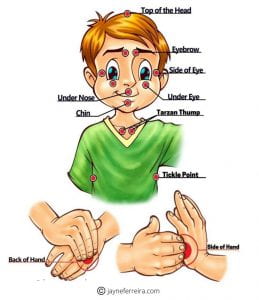What is Tapping?
“Tapping” is a simple, somatic stress management technique that involves gently tapping on specific points on the face and body. Clinical studies have demonstrated a rapid reduction in cortisol—the body’s primary stress hormone—along with other measurable physiological changes, often resulting in an increased sense of calm. A growing body of scientific and clinical research is contributing to a clearer understanding of the mechanisms that underpin this time-honored, experiential practice. Tapping may also be understood as a trauma-aware, trauma-competent mindfulness tool—one that is both accessible and easy to learn and apply.
How Do We Tap?
This Tap-along video, created by Ulf and Gunnila from the PeacefulHeart.se will guide you through the basic Tapping protocol and introduce the key Tapping points. Follow along and notice how your nervous system responds.
>> Watch the 5 min Tap-along Video for Stress Reduction and Calm (TTT) (Free to download).
Where Do We Tap?

Why Do We Tap?
Scientific studies on acupuncture indicate that stimulating specific points on the body can lead to changes in brain and nervous system activity. These changes may influence neurotransmitter and hormone production. Similarly, Tapping has been shown to help calm the nervous system and restore balance disrupted by unhealthy stress. It appears to work by interrupting the negative stress loop, preventing stress from accumulating.
By facilitating a quicker transition from a stressed state to a calmer one, Tapping can improve focus, enhance interpersonal relationships, support better decision-making, and promote overall well-being. These benefits contribute to increased productivity and greater happiness.
Where Can I Learn More?
You may find value in this recorded 30-minunte workshop offered by the Peaceful Heart Network (April 2021), which provides insights into why Tapping can be effective based on their experience and expertise.
For those interested in live sessions, a 30-minute online workshop is offered through USG Well-Being on the 3rd Fridays of each month. These sessions are open to everyone.
We have offered workshops with over 150 units across the Georgia Tech campus have participated in sessions ranging from 10 to 60 minutes, with groups of 10 to 200 participants since 2020, and you may spot us in Stress Busters and StressBuzzters events each semesters. If you would like to bring the Tapping experience to your unit or class, for team building, mindfulness, or emotional intelligence training, please contact tapping@ece.gatech.edu.
Anything Else To Be Aware of?
-
There are numerous variations and adaptations of Tapping, including Thought Field Therapy (TFT), Emotional Freedom Techniques (EFT), Trauma Tapping Techniques (TTT), and others. Among these, EFT is the most extensively studied, and its efficacy is supported by a growing body of peer-reviewed research, aligning with many of the benchmarks typically associated with evidence-based practices. This website, however, focuses on a simplified, non-verbal approach to Tapping. Variants of this method may also be referred to as “Trauma Tapping Techniques (TTT),” “Tap & Breathe,” “Bronze Tapping,” “Silent Tapping,” and similar terms, as the technique is often referred to differently by various practitioners.
- Tapping is generally regarded as safe for most individuals. However, as with any tools or techniques, there may be instances, though rare, where an individual experiences a temporary intensification of stress-related symptoms. When appropriately supported, such responses can lead to significant therapeutic progress. However, without adequate support, they may feel disorienting or distressing. If adverse effects occur, individuals are strongly encouraged to seek qualified emotional or clinical support to help process and integrate the experience effectively and with minimal discomfort.
Welcome to the new phase of self-care, self-regulation, connection and co-regulation.
“The ability to consistently self-regulate with EFT [Tapping] has greatly increased my quality of life. Better and more consistent moods, more present with clients, family, friends and colleagues….”
Dr. Robert Rhoton
CEO Arizona Trauma Institute, co-editor International Journal of Trauma Practice and Research


